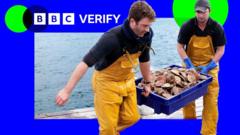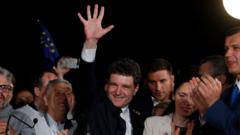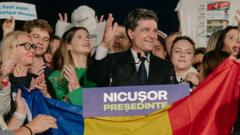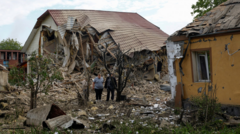In response to Russia’s invasion of Ukraine, the European Union has enacted its 17th package of sanctions, specifically targeting Moscow's covert oil fleet. This move aims to heighten economic pressure on Russia, compelling President Putin to engage in peace talks. Meanwhile, uncertainties linger over U.S. sanctions strategy following a recent diplomatic call between Presidents Trump and Putin.
EU Intensifies Sanctions on Russia Amid Ongoing Conflict in Ukraine

EU Intensifies Sanctions on Russia Amid Ongoing Conflict in Ukraine
The European Union implements tougher restrictions on Russia's covert oil exports as discussions about future sanctions continue following a recent U.S. policy shift.
European Union defense and foreign ministers formally adopted a fresh batch of sanctions against Russia on Tuesday, focusing on disguising oil exports after the European Commission President disclosed the intention to enforce even stricter measures. These actions are part of an ongoing strategy to inflict economic hardship on Russia, fostering an environment conducive to negotiations aimed at concluding the war in Ukraine.
As tensions rise regarding the United States' forthcoming approach, President Donald Trump appeared to ease previously established demands for an immediate cease-fire during a call with President Putin. Ukrainian President Volodymyr Zelensky expressed uncertainty concerning whether the United States would collaborate with Europe on escalating sanctions.
The latest sanctions constitute the 17th series placed on Russia in response to its full-scale invasion of Ukraine back in 2022. This new set specifically targets Russia's covert oil operations, which utilize aging tanker vessels to transport and market oil discreetly worldwide. Discussions are already underway for an 18th package, with officials considering further actions against gas pipelines, financial institutions, and measures to restrict Russia's energy sales globally.
European Union’s foreign policy chief, Kaja Kallas, emphasized the necessity of increasing pressure on Moscow, stating, “It takes two to want peace, and it takes only one to want war.” This acknowledgment signifies a determination from the EU to make Russia more amenable to discussions aimed at restoring peace in Ukraine.





















